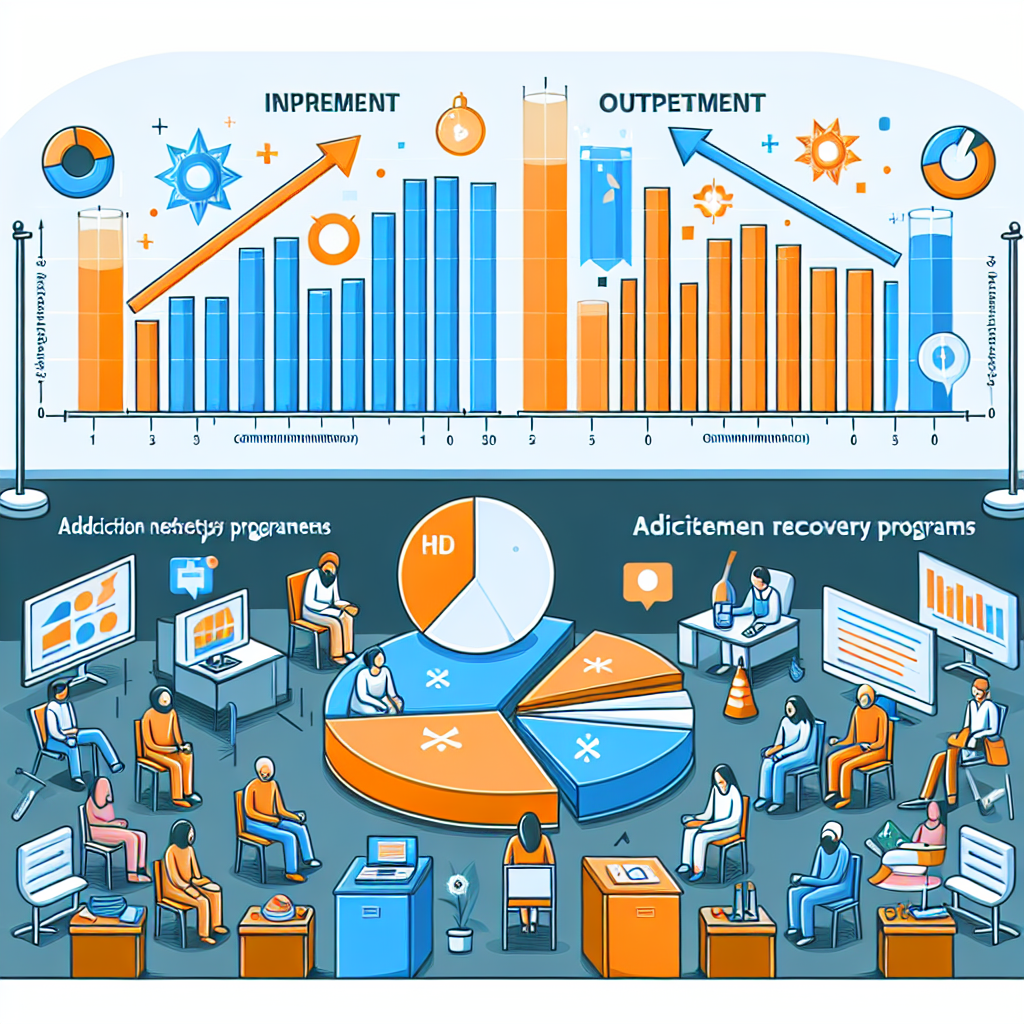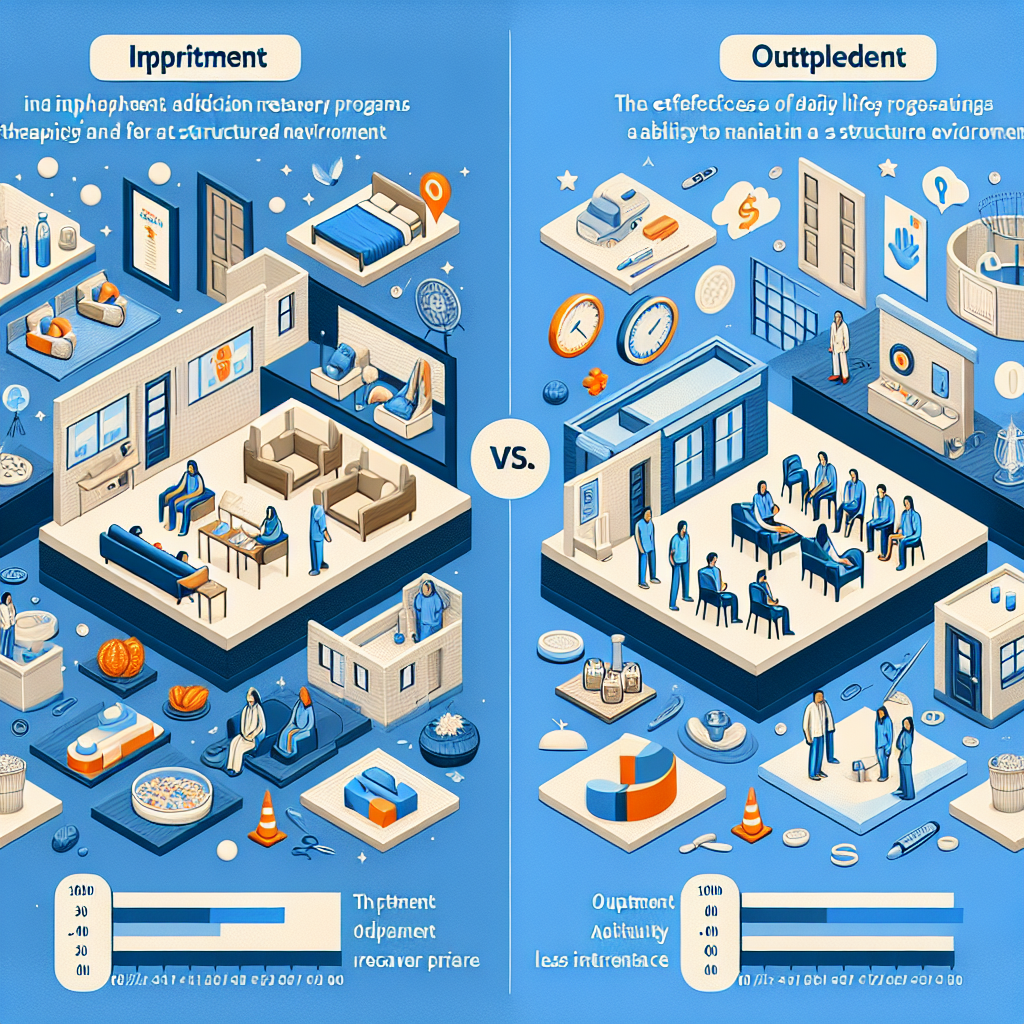-
Table of Contents

“Comparing Effectiveness: Inpatient vs. Outpatient Addiction Recovery Programs”
Introduction
Inpatient and outpatient addiction recovery programs are two primary modalities for treating substance use disorders, each with distinct approaches and varying degrees of effectiveness. Inpatient programs, also known as residential treatment, require patients to live at the treatment facility for a specified duration, providing a structured environment with 24-hour medical and emotional support. This immersive setting is particularly beneficial for individuals with severe addictions or co-occurring mental health disorders, as it removes them from environments that may trigger substance use. Outpatient programs, on the other hand, allow patients to live at home while attending scheduled treatment sessions, offering greater flexibility and enabling them to maintain work, school, or family responsibilities. The effectiveness of these programs can depend on various factors, including the severity of the addiction, the presence of co-occurring disorders, the individual’s support system, and their level of commitment to recovery. Research suggests that while both inpatient and outpatient programs can be effective, the choice between them should be tailored to the individual’s specific needs and circumstances to optimize outcomes.
Comparing Success Rates: Inpatient vs. Outpatient Addiction Recovery Programs
When it comes to overcoming addiction, the choice between inpatient and outpatient recovery programs can be a pivotal decision. Both approaches offer unique benefits and challenges, and understanding their effectiveness can help individuals make informed choices about their recovery journey. Inpatient programs, often referred to as residential treatment, require individuals to live at the treatment facility for a specified period, typically ranging from 28 days to several months. This immersive environment provides a structured setting where patients can focus entirely on their recovery without the distractions and triggers of everyday life. On the other hand, outpatient programs allow individuals to live at home while attending treatment sessions at a facility. This flexibility enables them to maintain their daily responsibilities, such as work or family commitments, while receiving the necessary support and therapy.
One of the primary advantages of inpatient programs is the intensive level of care provided. Patients have access to 24/7 medical and emotional support, which can be crucial during the initial stages of withdrawal and detoxification. The structured environment minimizes exposure to external triggers and negative influences, creating a safe space for individuals to develop coping strategies and build a solid foundation for long-term recovery. Additionally, the sense of community and peer support in inpatient settings can foster a strong network of encouragement and accountability, which is often instrumental in maintaining sobriety.
Conversely, outpatient programs offer a different set of benefits that can be equally effective for certain individuals. The flexibility of outpatient treatment allows patients to apply the skills and strategies they learn in real-time, navigating their daily environments while receiving ongoing support. This real-world application can be particularly beneficial for those with strong support systems at home or those who have already completed an inpatient program and are transitioning back to everyday life. Outpatient programs also tend to be more cost-effective, making them accessible to a broader range of individuals seeking help.
When comparing the success rates of inpatient and outpatient programs, it is essential to consider the individual needs and circumstances of each person. Research indicates that both types of programs can be effective, but their success often depends on factors such as the severity of the addiction, the presence of co-occurring mental health disorders, and the individual’s level of motivation and support. For instance, individuals with severe addictions or those who have relapsed multiple times may benefit more from the intensive, immersive nature of inpatient treatment. In contrast, those with milder addictions or strong external support systems may find outpatient programs more suitable and sustainable.
Moreover, the quality of the treatment program itself plays a significant role in its effectiveness. Both inpatient and outpatient programs should offer evidence-based therapies, such as cognitive-behavioral therapy (CBT), motivational interviewing, and medication-assisted treatment (MAT), tailored to the individual’s specific needs. The presence of qualified, compassionate staff and a comprehensive aftercare plan are also critical components that contribute to long-term success.
Ultimately, the journey to recovery is deeply personal, and there is no one-size-fits-all solution. Whether choosing an inpatient or outpatient program, the most important factor is the commitment to seeking help and the willingness to engage fully in the recovery process. With the right support and resources, individuals can overcome addiction and build fulfilling, sober lives. The path may be challenging, but the possibility of a brighter, healthier future makes every step worthwhile.
Key Differences in Effectiveness: Inpatient and Outpatient Addiction Treatment
When considering the journey to recovery from addiction, the choice between inpatient and outpatient treatment programs is a pivotal decision. Both approaches offer unique benefits and challenges, and understanding their effectiveness can help individuals make informed choices tailored to their specific needs. Inpatient addiction recovery programs, often referred to as residential treatment, require patients to live at the treatment facility for a designated period. This immersive environment provides a structured and supportive setting, which can be particularly beneficial for those with severe addictions or co-occurring mental health disorders. The round-the-clock care and supervision ensure that patients are removed from external triggers and stressors, allowing them to focus entirely on their recovery.
In contrast, outpatient addiction recovery programs offer more flexibility, allowing individuals to live at home and maintain their daily responsibilities while attending treatment sessions. This approach can be advantageous for those with milder addictions or strong support systems at home. Outpatient programs typically involve a combination of individual therapy, group counseling, and educational sessions, providing a comprehensive treatment plan without the need for residential stay.
One of the key differences in effectiveness between inpatient and outpatient programs lies in the level of intensity and support provided. Inpatient programs often boast higher success rates due to the controlled environment and constant access to medical and therapeutic support. The immersive nature of inpatient treatment can lead to more profound behavioral changes and a stronger foundation for long-term recovery. However, the effectiveness of inpatient programs can be influenced by the duration of the stay, with longer programs generally yielding better outcomes.
On the other hand, outpatient programs offer the advantage of real-world application. Patients can immediately implement coping strategies and skills learned during therapy in their daily lives, which can reinforce their recovery process. This real-time application can be particularly effective for individuals who have already completed an inpatient program and are transitioning back to their regular routines. Moreover, outpatient programs tend to be more cost-effective and accessible, making them a viable option for many individuals seeking treatment.
Despite these differences, the effectiveness of both inpatient and outpatient programs ultimately depends on the individual’s unique circumstances and commitment to recovery. Personal motivation, the presence of a supportive network, and the severity of the addiction all play crucial roles in determining the success of either approach. Additionally, the quality of the treatment program itself, including the expertise of the staff and the comprehensiveness of the therapeutic modalities offered, can significantly impact outcomes.
It is also worth noting that a combination of both inpatient and outpatient treatment can often provide the best results. Many individuals begin their recovery journey with an intensive inpatient program to stabilize their condition and then transition to an outpatient program for continued support and reinforcement of their recovery skills. This blended approach allows for a seamless continuum of care, addressing both the immediate needs of detoxification and stabilization as well as the long-term challenges of maintaining sobriety.
In conclusion, while both inpatient and outpatient addiction recovery programs have their distinct advantages, their effectiveness is largely determined by the individual’s specific needs and circumstances. By carefully considering the level of support required, the severity of the addiction, and the available resources, individuals can choose the most appropriate path to recovery. With dedication, support, and the right treatment plan, overcoming addiction is not only possible but achievable, paving the way for a healthier, more fulfilling life.
Q&A
1. **Question:** How do inpatient addiction recovery programs compare to outpatient programs in terms of structure and intensity?
**Answer:** Inpatient addiction recovery programs are generally more structured and intensive, providing 24/7 care and a controlled environment, which can be beneficial for individuals with severe addictions or those who need a stable environment to avoid triggers.
2. **Question:** What are the differences in long-term success rates between inpatient and outpatient addiction recovery programs?
**Answer:** Long-term success rates can vary based on individual circumstances, but studies often show that inpatient programs may have higher initial success rates due to the intensive support and removal from triggering environments, while outpatient programs can be equally effective for those with strong support systems and less severe addictions.
Conclusion
Inpatient addiction recovery programs generally offer more intensive, structured, and immersive treatment, which can be more effective for individuals with severe addictions or co-occurring mental health disorders. Outpatient programs, while less intensive, provide greater flexibility and allow individuals to maintain their daily responsibilities, which can be beneficial for those with milder addictions or strong support systems. The effectiveness of each program largely depends on the individual’s specific needs, the severity of the addiction, and the presence of a supportive environment. Both types of programs can be effective, but the choice should be tailored to the individual’s circumstances.



